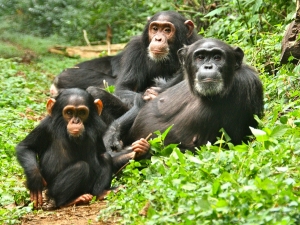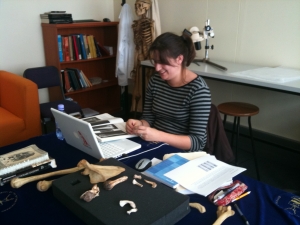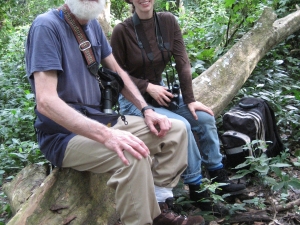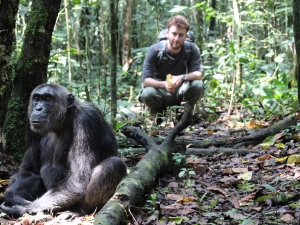Professor Ashley Gosselin-Ildari, Visiting Assistant Professor of Evolutionary Anthropology, was recognized by Dean Lee Baker for earning student course evaluations that fell among the top 5% of all undergraduate instructors of small and medium classes at Duke University. Dean Baker praised Dr. Gosselin-Ildari's commitment to teaching, dedication to students, and creative approaches. Well done, Dr. Gosselin-Ildari! read more about Professor Gosselin-Ildari recognized for teaching excellence »
Many people feel anxious in crowds. But not so for prairie voles. When these mouse-like creatures live in close quarters, they are less stressed out, researchers report in the January issue of the journal General and Comparative Endocrinology. The study is part of a larger field of research on how social stresses such as crowding and isolation affect brain chemistry and behavior in many species, including humans.Prairie voles are small rodents ubiquitous in meadows and grasslands in the Midwest and Canada. One of the few… read more about Togetherness Relieves Stress in Prairie Voles »
Spending time in close contact with others often means risking catching germs and getting sick. But being sociable may also help transmit “good” microbes, finds a multi-institutional study of gut microbiomes in chimpanzees.Researchers monitored changes in the gut microbes and social behavior of wild chimpanzees over eight years in Gombe National Park, Tanzania. They found that the number of bacteria species in a chimp’s GI tract goes up when the chimps are more gregarious. The results help scientists better understand the… read more about Gregarious Chimps Harbor Richer Gut Microbiomes »
Insomniacs take heart: Humans get by on significantly less sleep than our closest animal relatives. The secret, according to a new study, is that our sleep is more efficient.Researchers from Duke University scoured the scientific literature and compiled a database of slumber patterns across hundreds of mammals including 21 species of primates -- from baboons and lemurs to orangutans, chimpanzees and people. They then used statistical techniques to account for each species’ position in the primate family tree.They found that… read more about Humans Evolved for Better Sleep In Less Time »
[Updated] The memorial service for Ernestine Friedl, an internationally known anthropologist and first female dean of Trinity College of Arts & Sciences, will be held at 3 p.m. Friday, Oct. 23, in Baldwin Auditorium. A reception will follow in the Friedl Building, the East Campus humanities facility named after her.Friedl died Oct. 12 at The Cedars in Chapel Hill. She was 95.Her deanship was significant as a new structure at Duke, combining the deanship of students in Trinity College with the… read more about Memorial Service for Former Trinity Dean Ernestine Friedl Set for Oct. 23 »
Biological Anthropology and Anatomy alum, Julie Rushmore, is currently working with chimpanzees in Uganda. Her work was recently featured in Discover Magazine. read more about Julie Rushmore (BAA alum) featured in Discover Magazine »
An example of the game for testing whether the dog uses her nose or her memory to find a treat.Five hundred citizen scientists around the world have contributed data to a study of what goes on inside the minds of their dogs. The research, appearing Sept. 16 in Plos One, analyzes data collected by 500 dog owners who played the same games at home that researchers use in the laboratory to find out about a dog’s cognitive skills and problem-solving. On five of the seven tests analyzed,… read more about Citizen Scientists Contribute to Dog Research »
Charlie Brown, a two-year-old spaniel, loses focus under pressure in an experiment at the Duke Canine Cognition Center. A new study by Duke researchers finds that extra stress and stimulation can make hyper dogs like Charlie choke but gives mellow dogs an edge. Credit: Video by Emily Bray, Duke Canine Cognition Center People aren’t the only ones who perform better on tests or athletic events when they are just a little bit nervous -- dogs do too. But in dogs as in people,… read more about Stress ‘Sweet Spot’ Differs for Mellow vs. Hyper Dogs »
Video shows the 3-dimensional computer model of the oldest known Old World monkey skull, believed to be 15 million years old. Video courtesy of Fred Spoor of the Max Planck Institute for Evolutionary Anthropology. The brain hidden inside the oldest known Old World monkey skull has been visualized for the first time. The creature’s tiny but remarkably wrinkled brain supports the idea that brain complexity can evolve before brain size in the primate family tree. The ancient monkey… read more about Old World Monkey Had Tiny, Complex Brain »
Marisa Macias (PhD, 2015) studies fossils of the 1.98 million year old hominin species Australopithecus sediba in a lab at the University of the Witwatersrand in Johannesburg, South Africa. Macias studied functional integration of the musculoskeletal system of the upper limb in apes, humans, and fossil hominins for her doctoral dissertation. read more about Marisa Macias (PhD, 2015) – Johannesburg, South Africa »
Professor Tom Struhsaker (left) and Ruth Steel Mock (PhD, 2012) (right) pause for a picture during fieldwork in Magombera forest in Mang'ula, Tanzania. The two were observing Udzungwa red colobus monkeys in preparation for Steel Mock’s dissertation research on how ecological factors influence the behavioral ecology of this species. read more about Ruth Steel Mock (PhD, 2012) – Mang’ula, Tanzania »
Valerie Sheares Ashby, a professor and chair of the chemistry department at the University of North Carolina at Chapel Hill (UNC-CH), will be the next dean of Trinity College of Arts & Sciences at Duke University beginning July 1, Duke President Richard H. Brodhead and Provost Sally Kornbluth announced Thursday.Ashby will oversee the university's core academic units, which offer courses and degrees across the arts, humanities, social sciences and natural sciences. She succeeds Laurie Patton, who will be the new… read more about Valerie Ashby to Become Arts & Sciences Dean »
A little more than two months after the TV-star lemur known as Zoboomafoo died at age 20, his fifth grandbaby -- a girl -- has been born at the Duke Lemur Center.Her name is Isabella, and she's doing great.Her grandfather's real name was Jovian, and his legacy lives on in seven surviving offspring and five grandbabies, as well as syndication of 65 beloved episodes of the PBS children's show Zoboomafoo that Jovian starred in from 1999 to 2001.Isabella is a female Coquerel’s sifaka, a type of lemur found only on the island… read more about Zoboomafoo's Granddaughter Born at Duke »
Duke alumnus Aaron Sandel is a PhD student in Anthropology at the University of Michigan. He writes from Ngogo, in the center of Kibale National Park in Uganda, home to 200 chimpanzees, the subjects of his dissertation. A National Geographic Young Explorers grant in 2013 got him through the angst of finalizing a dissertation project. Now, he studies angst, or at least the closest thing to it: friendship and the transition to adulthood in male chimpanzees. When he's not focused on following a chimpanzee, his forest daydreams… read more about Alumnus Aaron Sandel - National Geographic Young Explorer »




